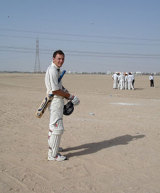Early in 2006 Simon Copleston left London and headed to a new job in the UAE. A cricket fanatic, he expected there would be no shortage of expat Brits playing the game but was surprised to find there were none. Instead, he joined a local league populated almost entirely by Indians and Pakistanis who work in the country. Here he recounts the experiences of his first season.

|

A million miles from Surrey: Simon Copleston prepares to go out to bat
© Cricinfo
|
|
There is something lost and something gained from desert cricket. As the batting team shelters from the sun in a sweltering minibus, they chatter in Urdu and listen to taped readings from the Koran. Tea consists of bananas, warm bottled water, and sugary tea. There is very little of the quintessentially English game left when 45-degree heat beats down, wind drives sand into the players' eyes, and the outfield is too hot to touch.
Grass and trees do not grow naturally in Abu Dhabi so the imported turf needs constant watering. Desert pitches have concrete wickets with no matting. The outfield is rolled sand and is exposed and crossed by strong winds. The sand and concrete are unforgiving and diving in the outfield is rare and painful. There are no quaint pavilions here, no sandwiches and scones, no rolling fields or oak trees, no polite applause as the ball skims across lush-green outfields. To survive in this league, you need resilience and skin like asbestos.
Cricket is not the most likely sport to be played in a Gulf petrodollar city surrounded by desert: Arabs have more sense than to spend long hours outside in the heat. But thanks to a strong subcontinent population and a booming economy, Abu Dhabi's cricket tradition has grown stronger than that of nearby Sharjah - Abu Dhabi now has over 1000 registered players. Sharjah's stadium has not hosted an international match since 2003 while Abu Dhabi's new Sheikh Zayed Stadium recently hosted international series between India and Pakistan (2006) and Pakistan and Sri Lanka (2007). Sussex visited for pre-season warm-up matches in 2007 and five county sides are set to come over in 2008.
When I moved to Abu Dhabi, I prepared to be wooed by expat clubs vying for a half-decent batsman. Not so. There are none. Unfazed, I pestered the British Embassy, whose manicured lawns and traditional English pub must, I felt, be replete only with a cricket team. Again, not so. I was forced to look elsewhere, to the new stadium, built in a patch of desert on the outskirts of Abu Dhabi, set against the backdrop of one of the largest mosques in the world, and surrounded by desert pitches; a breathtaking scene at sunset.
 A typical Pakistani in UAE earns a few hundred dollars a month ... many are separated from their families, live in cramped conditions and have little spare time. Yet they have never forsaken their love of cricket
A typical Pakistani in UAE earns a few hundred dollars a month ... many are separated from their families, live in cramped conditions and have little spare time. Yet they have never forsaken their love of cricket

|
These pitches host a season consisting of a 25-over combined league and knock-out competition between September and May. In April and May temperatures soar beyond 40 degrees, so matches start at 7am. Teams are generally sponsored by local businesses, but mine consists of friends and acquaintances of Imam, a local insurance broker. Most players are Indian or Pakistani. As far as I know, I am currently the only non-Asian player in the league.
A typical Pakistani in UAE earns a few hundred dollars a month, often working in labour-intensive industries. Conditions are hard. Many are separated from their families, live in cramped conditions and have little spare time. Yet they have never forsaken their love of cricket.
Nadeem is one of thousands of Pakistani immigrants in UAE, who along with an equal population of Indians have encouraged cricket to flourish. Nadeem's English is practically fluent compared with my three words of Urdu. No matter - our language is cricket and we have a firm friendship.
I'm happy to have been allowed to indulge my passion for the game over the past seasons, even in conditions far different from those at home. Early on, Nadeem watched me trudge, head bowed, back to the mobile pavilion after another low score. I struggled to adjust to the fast pace of the concrete wickets. I knew I needed to hit the ball upwards to avoid burying it in sand, but long years of practice and coaching taught me the opposite. "Don't be downhearted, my dear," he said. "Just enjoy the game with us, fellow cricket lovers."

